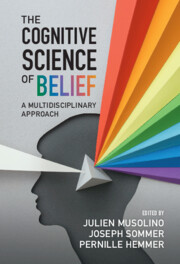Book contents
- The Cognitive Science of Belief
- The Cognitive Science of Belief
- Copyright page
- Contents
- Figures and Tables
- Contributors
- Chapter 1 Introduction
- Part I Understanding Belief
- Part II Domains of Beliefs
- Part III Variation in Beliefs
- Pathological Beliefs
- Individual Differences in Beliefs
- Environmental Effects on Beliefs
- Chapter 23 Belief in Human Rights: An Opportunity for Cross-Cultural Cognitive Science
- Chapter 24 The Belief–Action Gap in Environmental Psychology: How Wide? How Irrational?
- Toward Better Beliefs
- Index
- References
Chapter 23 - Belief in Human Rights: An Opportunity for Cross-Cultural Cognitive Science
from Environmental Effects on Beliefs
Published online by Cambridge University Press: 03 November 2022
- The Cognitive Science of Belief
- The Cognitive Science of Belief
- Copyright page
- Contents
- Figures and Tables
- Contributors
- Chapter 1 Introduction
- Part I Understanding Belief
- Part II Domains of Beliefs
- Part III Variation in Beliefs
- Pathological Beliefs
- Individual Differences in Beliefs
- Environmental Effects on Beliefs
- Chapter 23 Belief in Human Rights: An Opportunity for Cross-Cultural Cognitive Science
- Chapter 24 The Belief–Action Gap in Environmental Psychology: How Wide? How Irrational?
- Toward Better Beliefs
- Index
- References
Summary
Whether it concerns moral attitudes across cultures or claims about what people deserve, human rights, in theory and practice, involves beliefs. Yet, inquiries about belief, such as community-wide dispositions toward human rights claims and (more importantly for legal and cultural systems of rights) what it means to support human rights and how that support is increasing worldwide, are often marginalized. That marginalization is due, in part, to the reluctance of some social scientists to consider the concepts of universality or belief, since these have often been considered western concepts that are wrongfully imposed on others. As this chapter shows, however, the prospective universality of human rights, or what advocates typically describe as an overlapping consensus, remains a critical issue in the field. Moreover, skepticism about belief across cultures is usually grounded in misconceptions about the very concept of belief. All of this entails that belief in human rights is an important topic that is open to research in the brain and behavioral sciences. This chapter considers how human rights beliefs relate to the transdisciplinary study of belief and offers opportunities for cross-cultural cognitive science.
Keywords
- Type
- Chapter
- Information
- The Cognitive Science of BeliefA Multidisciplinary Approach, pp. 515 - 535Publisher: Cambridge University PressPrint publication year: 2022

